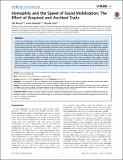| dc.contributor.author | Alstott, Jeff | |
| dc.contributor.author | Madnick, Stuart E. | |
| dc.contributor.author | Velu, Chander | |
| dc.date.accessioned | 2014-06-20T15:00:14Z | |
| dc.date.available | 2014-06-20T15:00:14Z | |
| dc.date.issued | 2014-04 | |
| dc.identifier.issn | 1932-6203 | |
| dc.identifier.uri | http://hdl.handle.net/1721.1/88045 | |
| dc.description.abstract | Large-scale mobilization of individuals across social networks is becoming increasingly prevalent in society. However, little is known about what affects the speed of social mobilization. Here we use a framed field experiment to identify and measure properties of individuals and their relationships that predict mobilization speed. We ran a global social mobilization contest and recorded personal traits of the participants and those they recruited. We studied the effects of ascribed traits (gender, age) and acquired traits (geography, and information source) on the speed of mobilization. We found that homophily, a preference for interacting with other individuals with similar traits, had a mixed role in social mobilization. Homophily was present for acquired traits, in which mobilization speed was faster when the recuiter and recruit had the same trait compared to different traits. In contrast, we did not find support for homophily for the ascribed traits. Instead, those traits had other, non-homophily effects: Females mobilized other females faster than males mobilized other males. Younger recruiters mobilized others faster, and older recruits mobilized slower. Recruits also mobilized faster when they first heard about the contest directly from the contest organization, and decreased in speed when hearing from less personal source types (e.g. family vs. media). These findings show that social mobilization includes dynamics that are unlike other, more passive forms of social activity propagation. These findings suggest relevant factors for engineering social mobilization tasks for increased speed. | en_US |
| dc.description.sponsorship | National Institutes of Health (U.S.) (NIH-Oxford-Cambridge Scholarship Program) | en_US |
| dc.description.sponsorship | Oxford University (NIH-Oxford-Cambridge Scholarship Program) | en_US |
| dc.description.sponsorship | University of Cambridge (NIH-Oxford-Cambridge Scholarship Program) | en_US |
| dc.description.sponsorship | Sloan School of Management (John Norris Maguire Professor of Information Technology Chair account) | en_US |
| dc.description.sponsorship | Langley Castle Hotel | en_US |
| dc.language.iso | en_US | |
| dc.publisher | Public Library of Science | en_US |
| dc.relation.isversionof | http://dx.doi.org/10.1371/journal.pone.0095140 | en_US |
| dc.rights | Creative Commons Attribution | en_US |
| dc.rights.uri | http://creativecommons.org/licenses/by/4.0/ | en_US |
| dc.source | Public Library of Science | en_US |
| dc.title | Homophily and the Speed of Social Mobilization: The Effect of Acquired and Ascribed Traits | en_US |
| dc.type | Article | en_US |
| dc.identifier.citation | Alstott, Jeff, Stuart Madnick, and Chander Velu. “Homophily and the Speed of Social Mobilization: The Effect of Acquired and Ascribed Traits.” Edited by Angel Sánchez. PLoS ONE 9, no. 4 (April 16, 2014): e95140. | en_US |
| dc.contributor.department | Massachusetts Institute of Technology. Engineering Systems Division | en_US |
| dc.contributor.department | Sloan School of Management | en_US |
| dc.contributor.mitauthor | Madnick, Stuart E. | en_US |
| dc.relation.journal | PLoS ONE | en_US |
| dc.eprint.version | Final published version | en_US |
| dc.type.uri | http://purl.org/eprint/type/JournalArticle | en_US |
| eprint.status | http://purl.org/eprint/status/PeerReviewed | en_US |
| dspace.orderedauthors | Alstott, Jeff; Madnick, Stuart; Velu, Chander | en_US |
| dc.identifier.orcid | https://orcid.org/0000-0001-9240-2573 | |
| mit.license | PUBLISHER_CC | en_US |
| mit.metadata.status | Complete | |
